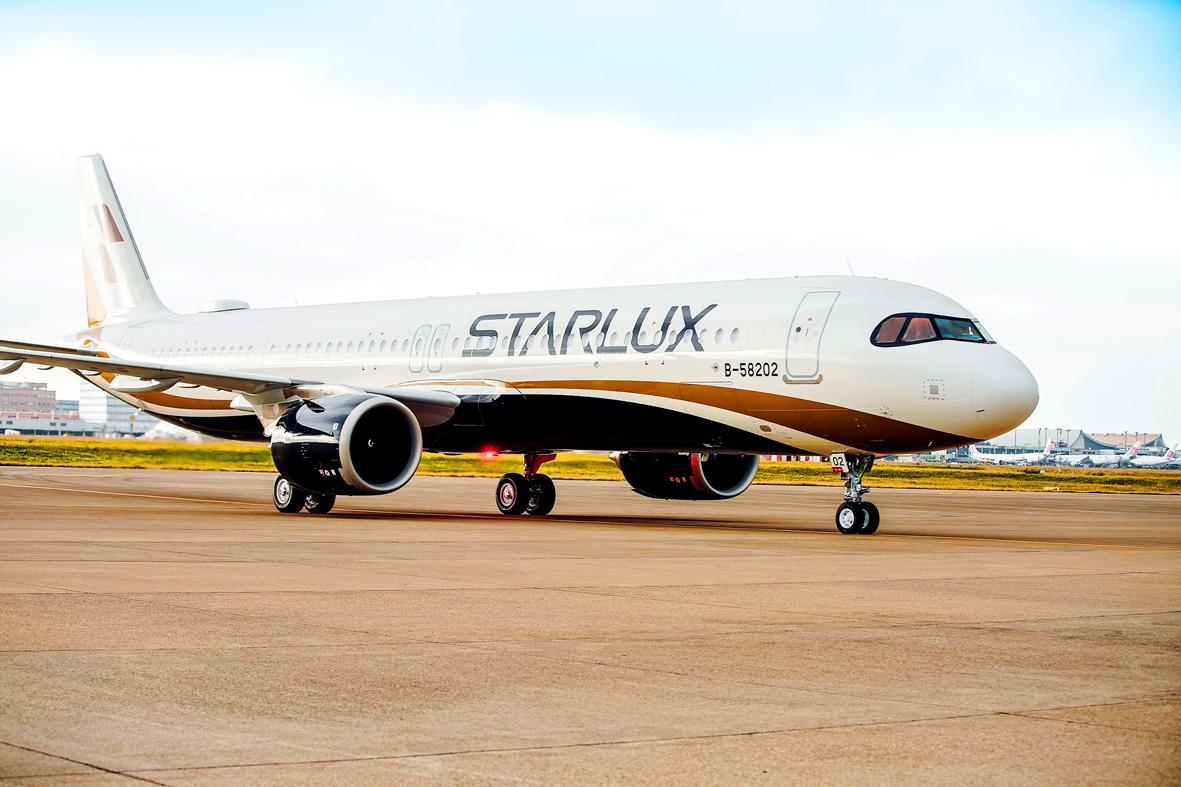Starting next month, Starlux Airlines Co (星宇航空) is to increase its number of flights to Macau and Penang, Malaysia, to meet rising air cargo demand and help its pilots build up flight hours, the airline said yesterday.
From Aug. 1, Starlux is to offer four round-trip flights from Taiwan Taoyuan International Airport to Macau International Airport every Tuesday, Wednesday, Friday and Sunday, compared with three per week now, it said in a statement.
It would also operate three round-trip flights per week from Taoyuan to Penang International Airport every Tuesday, Thursday and Saturday, from two at present, it said.

Photo courtesy of StarLux Airlines
Although air travel is unlikely to rebound quickly in the third quarter as the COVID-19 pandemic shows no signs of slowing, Starlux decided to expand its operations on expectations that the air cargo business would remain rosy, spokesman Nieh Kuo-wei (聶國維) told the Taipei Times by telephone.
The airline, which was struck by the pandemic after beginning operations on Jan. 23, has been concentrating on cargo services between Taiwan and Macau and Penang to mitigate the effects of a faltering passenger business amid travel restrictions.
“Frankly speaking, we would operate the flights even without any passenger, as the cargo revenue would be enough to cover variable costs,” Nieh said.
However, Starlux has yet to resume its operations to Da Nang, as Vietnam has not eased its restrictions on air travel and cargo demand is low, he said.
Starlux also wants its pilots to accumulate more flight hours, which would give it an advantage when applying to the Civil Aeronautics Administration to launch new flights, Nieh said.
In related news, EVA Airways Corp (長榮航空) yesterday said it is likely to increase its flights in the third quarter, as many countries ease border controls.
“We adjust our flight schedules on a rolling basis depending on the pandemic, official measures and consumer demand,” it said.
In the short term, domestic air travel would continue to outperform international travel, as a mandatory 14-day quarantine for returning citizens has dampened desire to travel abroad, it said.
As EVA lends its planes to Uni Air (立榮航空), which has been increasing its flights to outlying islands due to high demand, it also benefits from the domestic travel boost, it said.

SELL-OFF: Investors expect tariff-driven volatility as the local boarse reopens today, while analysts say government support and solid fundamentals would steady sentiment Local investors are bracing for a sharp market downturn today as the nation’s financial markets resume trading following a two-day closure for national holidays before the weekend, with sentiment rattled by US President Donald Trump’s sweeping tariff announcement. Trump’s unveiling of new “reciprocal tariffs” on Wednesday triggered a sell-off in global markets, with the FTSE Taiwan Index Futures — a benchmark for Taiwanese equities traded in Singapore — tumbling 9.2 percent over the past two sessions. Meanwhile, the American depositary receipts (ADRs) of Taiwan Semiconductor Manufacturing Co (TSMC, 台積電), the most heavily weighted stock on the TAIEX, plunged 13.8 percent in

A wave of stop-loss selling and panic selling hit Taiwan's stock market at its opening today, with the weighted index plunging 2,086 points — a drop of more than 9.7 percent — marking the largest intraday point and percentage loss on record. The index bottomed out at 19,212.02, while futures were locked limit-down, with more than 1,000 stocks hitting their daily drop limit. Three heavyweight stocks — Taiwan Semiconductor Manufacturing Co (TSMC, 台積電), Hon Hai Precision Industry Co (Foxconn, 鴻海精密) and MediaTek (聯發科) — hit their limit-down prices as soon as the market opened, falling to NT$848 (US$25.54), NT$138.5 and NT$1,295 respectively. TSMC's

TARIFFS: The global ‘panic atmosphere remains strong,’ and foreign investors have continued to sell their holdings since the start of the year, the Ministry of Finance said The government yesterday authorized the activation of its NT$500 billion (US$15.15 billion) National Stabilization Fund (NSF) to prop up the local stock market after two days of sharp falls in reaction to US President Donald Trump’s new import tariffs. The Ministry of Finance said in a statement after the market close that the steering committee of the fund had been given the go-ahead to intervene in the market to bolster Taiwanese shares in a time of crisis. The fund has been authorized to use its assets “to carry out market stabilization tasks as appropriate to maintain the stability of Taiwan’s

In a small town in Paraguay, a showdown is brewing between traditional producers of yerba mate, a bitter herbal tea popular across South America, and miners of a shinier treasure: gold. A rush for the precious metal is pitting mate growers and indigenous groups against the expanding operations of small-scale miners who, until recently, were their neighbors, not nemeses. “They [the miners] have destroyed everything... The canals, springs, swamps,” said Vidal Britez, president of the Yerba Mate Producers’ Association of the town of Paso Yobai, about 210km east of capital Asuncion. “You can see the pollution from the dead fish.